| Srl | Item |
| 1 |
ID:
145921
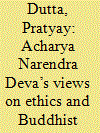

|
|
|
|
|
| Summary/Abstract |
Acharya Narendra Deva strongly believed that the Gandhian ideas based on morality and ethics could be the only solution to meet the basic needs of a society both developing and developed. He wielded the Gandhian weapon of satyagraha most effectively to fight every form of injustice against the oppressed and the depressed in the then Indian society. He remained a pathfinder of the socialist movement in India and felt that without political independence the socialist programme could never become a reality. The purpose of the article is to highlight the impact of ethics and Buddhism on Narendra Deva’s overall socio-political ideas and its relevance in the 21st century.
|
|
|
|
|
|
|
|
|
|
|
|
|
|
|
|
| 2 |
ID:
130826
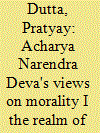

|
|
|
|
|
| Publication |
2014.
|
| Summary/Abstract |
Acharya Narendra Deva strongly believed that the Gandhian ideas based on morality and ethics could be the only solution to meet the basic needs of a society both developing and developed. It was thus that even after independence, he wielded the Gandhian weapon of Satyagraha most effectively to ?ght every form of injustice against the oppressed and the depressed in the then Indian society. Like Gandhi, he gave the highest priority for the removal of rural backwardness and he was in favour an innovative technology that could help in bringing an all round development in a developing society. He was a profound thinker who could analysis political, economic and social problems in their totality and his socio~political ideas about the solution to the problems facing the nation and society was exclusively original in its entirety. Narendra Deva accepted the value of morality and ethics of Gandhi and practised it fully throughout his whole life. It was Gandhi, who ?rst demonstrated the powerful effect on his countrymen of renouncing wealth for the sake of human service rather than personal salvation and Deva had trodden the same pathway into lndia's heart. Gandhi and Narendra Deva acquired their moral strength through renunciation, much as lndia's ancient sageswere supposed to obtain magical powers through their austerities. Their magic was singleness of purpose and an iron will. When Deva joined the Indian political
struggle under Gandhian leadership, the Mahatma once told him to simplify life and he took his words to heart. They never urged anyone else to follow their way of life and went their own way with a striking serenity. As a leading intellectual of outstanding mould, Acharya Narendra Deva had a forceful urge to bring about social justice, processed through a strong vein of idealism and always expressed deep concern for the down- trodden lndian masses. He remained a path?nder of the socialist movement in India and strongly believed that freedom was the first postulate for the establishment of the socialist society in India. He felt that without political independence the socialist programme could never become a reality. Narendra Deva always emphasized the moral and cultural elements of Marxism, but in the Indian socio-political context, he said that the class con?ict was already in existence and the real question was on whose side you were going to stand. Moreover, it was wrong to assume that the capitalist class had no vested interest in the freedom struggle. He, therefore, viewed that the socialists should create consciousness among labour, convince them that their interest would be well protected inn the freedom struggle and should broaden the base of that struggle by organizing the toilers. That is why; Gandhi and Deva wanted the historical stream of the cultural progress of India, in order to sustain the flow of continuity. In fact, Gandhi and Narendra Deva's entire socio-political ideas were ofa new social order purely based on universal love, ahimsa, morality and most importantly the role of ethics in Indian politics. Gandhi's ideal society was a non-violent and stateless society and repudiated state on ethical, historical and economic grounds. Unlike Marx, Gandhi and Deva persistently put emphasis on moral force and on the - realization of one's own self and there was no place for violence in their whole socio-political philosophy. The purpose ofthe article is to highlight the impact of ethics and morality on Narendra Deva's socio-political ideas and its relevance in the 21" century.
|
|
|
|
|
|
|
|
|
|
|
|
|
|
|
|
| 3 |
ID:
136845
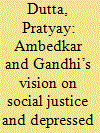

|
|
|
|
|
| Summary/Abstract |
The influence of Babasaheb Ambedkar and Gandhi’s on nationalist India are well-known. They all through their entire life wanted total freedom and upliftment of the Indian masses, i.e., their material and moral advancement. In the pre and post-independence period, Ambedkar divided Indians into two classes, the rich-the upper class and the poor-the lower class.
|
|
|
|
|
|
|
|
|
|
|
|
|
|
|
|
| 4 |
ID:
152634
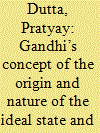

|
|
|
|
|
| Summary/Abstract |
Revered the world over for his Non-violent philosophy of passive resistance, Mohandas Karamchand Gandhi was known to his many followers as Mahatma, or “the great soul.” We are today passing through an extremely controversial phase of terrorism and much explosive violence around the world.
|
|
|
|
|
|
|
|
|
|
|
|
|
|
|
|
| 5 |
ID:
110408
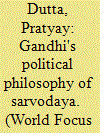

|
|
|
| 6 |
ID:
101050
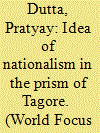

|
|
|
| 7 |
ID:
189621
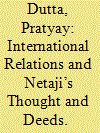

|
|
|
|
|
| Summary/Abstract |
Subhash Chandra Bose was a great humanist, synthesizer and cosmopolitan thinker . And his contribution was not limited in Indian political thought. He was not only committed to humanity and peace in Indian society, actually he was committed to promote humanity and peace in Indian society. Subhash Chandra Bose is popularly known as Netaji. It was under the influence of his parents that he developed a profoundly religious and spiritual frame of mind and love for Hindu scriptures from his early life to the last days of his glorious career in the battlefields of South East Asia in 1945. The credential of Subhash Chandra Bose as a socio-political thinker would be well traced on a careful study of his activities, letters, writings and speeches at different phases of the freedom struggle, indicating a process of evolution of his social, economic and political concepts connected with the development of his own mind responding to the shifting environment in India and the World outside.
|
|
|
|
|
|
|
|
|
|
|
|
|
|
|
|
| 8 |
ID:
123420
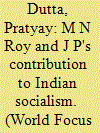

|
|
|
|
|
| Publication |
2013.
|
| Summary/Abstract |
Manendra Nath Roy (1886-1954) and Jayaprakash Narayan (1902-1979), both popularly known as M.N. Roy and J.P., occupy unique positions among the galaxy of political leaders produced by India in modern times. They played a major role not merely in the struggle for freedom from foreign rule, but also in shaping the minds of people as well as events after the achievement of our political freedom.
|
|
|
|
|
|
|
|
|
|
|
|
|
|
|
|
| 9 |
ID:
125307
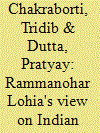

|
|
|
|
|
| Publication |
2013.
|
| Summary/Abstract |
Looking back over the years since Dr.Rammanohar Lohia's death one cannot but feel that he died at a time when a whole epoch was passing away to make room for the rise of a new one. In the international affairs the rigid system of two blocks of nations with a Super Power at the centre of each was gradually melting into a period of general détente and overlapping parallelograms of forces.
|
|
|
|
|
|
|
|
|
|
|
|
|
|
|
|
| 10 |
ID:
150608
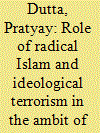

|
|
|
|
|
| Summary/Abstract |
Radical Islamic fundamentalism has been defined variously as a movement of Muslims who hearken back to earlier times and seek to return to the fundamentals of the religion. Radical political Islam is an Islamic revival movement often characterized by moral conservatism and the attempt to implement Islamic values in all spheres of life. In recent decades, life in this word has become precariously insecure because of religious fundamentalism, which is assuming menacing proportions with each passing day. Ideological terrorism has now become a worldwide phenomenon. The present article mainly focuses on the origin and subsequent development of Radical Islam vis-à-vis ideological terrorism in the national and international context on the question of security and global integration.
|
|
|
|
|
|
|
|
|
|
|
|
|
|
|
|
| 11 |
ID:
145379
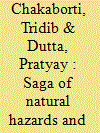

|
|
|
|
|
| Summary/Abstract |
Today, most of the states have adopted a national disaster management policy. One of its important components is the use of information technology to improve and facilitate disaster management. Looking at the massive destruction caused to the lives and livelihoods by the recurring natural disasters in different parts of the world it has been increasingly realized that though complete prevention of natural disasters is beyond human capabilities, the adverse impact of any disaster on human lives and their livelihoods can be minimized by taking adequate early warning, preparedness and mitigation measures.
|
|
|
|
|
|
|
|
|
|
|
|
|
|
|
|
| 12 |
ID:
135445
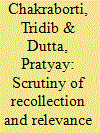

|
|
|
|
|
| Summary/Abstract |
Acharya Narendra Deva was one of the founder figures of the Socialist Movement in India and he believed in the extreme nationalism as propagated by Aurobindo and Bal Gangadhar Tilak. In the realm of foreign policy, he felt the need to establish Scientific Socialism for the solution of India’s problems and considered the working class as the vanguard, the peasants and the intelligentsia as the auxiliary of an anti-imperialist struggle.
|
|
|
|
|
|
|
|
|
|
|
|
|
|
|
|
| 13 |
ID:
116276
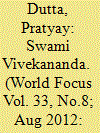

|
|
|